- Home
- J. G. Ballard
Super-Cannes Page 5
Super-Cannes Read online
Page 5
SUNLIGHT WAS INFILTRATING the misty lakes and forests of Eden-Olympia, probing the balconies of the residential enclave as if trying to rouse the company chairmen and managing directors, calling them out to play. I stood in the open doorway of the breakfast room, letting the warm air bathe my legs. An advertising plane was taking off from the Cannes-Mandelieu airfield, and I realized that my shadow was probably one of the few human silhouettes still visible from the sky over the business park.
It was 7.45, but my neighbours had already left for work. Long before the sun reached across the Baie des Anges the senior executives had finished their croissants and muesli, their mortadella and noodles, and set off to another long day at the office.
As I settled myself in a poolside chair the sun seemed to pause, surprised to find someone not already bent over a boardroom table or laboratory bench. Along the Croisette in Cannes the day would hardly have begun. The waiters at the Blue Bar would be pausing for a cigarette before they set out the table placements, and the water trucks would still be spraying the side roads off the Rue d’Antibes. But in Eden-Olympia the mainframes would be wide awake, the satellite dishes draining information stored in the sky. A busy electronic traffic was already sluicing through the cabled floors, bringing the Dow and Nikkei indexes, inventories of pharmaceutical warehouses in Düsseldorf and cod depositories in Trondheim.
Thinking of Jane, who had been up at six and off to the clinic before I woke, I eased myself onto the sun-lounger and lifted my right leg above the foam rubber cushion. After only three weeks at Eden-Olympia, as Jane had promised, I was free of the metal brace. Now I could drive the Jaguar and give Jane a rest from the heavy steering wheel. Above all, I was able to walk, and keep up with her as we strolled down the Croisette towards the seafood restaurants of the Vieux Port.
I counted the titanium claws that held the kneecap together. My wasted right calf was as thin as my forearm, and gave me a rolling, seadog gait. But exercise would strengthen the muscles. One day I would be able to work the heavy brake pedals of the Harvard and win back my private pilot’s licence.
In the meantime I explored Eden-Olympia on foot, logging miles along the simulated nature trails that ended abruptly when they were no longer visible from the road. Ornamental pathways led to the electricity substations feeding power into the business park’s grid. Surrounded by chain-link fences, they stood in the forest clearings like mysterious and impassive presences. I circled the artificial lakes, with their eerily calm surfaces, or roamed around the vast car parks. The lines of silent vehicles might have belonged to a race who had migrated to the stars.
By the early afternoon Charles’s e-mails brought me final proof pages, cheery gossip about the latest office romances, and queries over the editorial copy of our aviation journals. I missed Jane, who never returned home before seven o’clock, but I was happy to doze on the sun-lounger and listen to the droning engines of light aircraft trailing their pennants across the cloudless sky, news from the sun of furniture sales, swimming pool discounts and the opening of a new aqua-park.
A lawnmower sounded from a nearby garden as the roving groundstaff trimmed the grass. Sprinklers hissed a gentle drizzle across the flowerbeds of the next-door villa, occupied by Professor Ito Yasuda, chairman of a Japanese finance house, his serious-faced wife and even more serious three-year-old son. On Sundays they played tennis together, a process as stylized as a Kabuki drama, which involved endless ball retrieval and virtually no court action.
My other neighbours were a Belgian couple, the Delages, among the earliest colonists of the business park. Alain Delage was the chief financial officer of the Eden-Olympia holding company, a tall, preoccupied accountant lost somewhere behind the lenses of his rimless glasses. But he was kind enough to give Jane a lift to the clinic each morning. I had met the couple, Delage and his pale, watchful wife Simone, but our brief conversation across the roof of their Mercedes would have been more expressive if carried out by semaphore between distant peaks in the Alpes-Maritimes.
Intimacy and neighbourliness were not features of everyday life at Eden-Olympia. An invisible infrastructure took the place of traditional civic virtues. At Eden-Olympia there were no parking problems, no fears of burglars or purse-snatchers, no rapes or muggings. The top-drawer professionals no longer needed to devote a moment’s thought to each other, and had dispensed with the checks and balances of community life. There were no town councils or magistrates’ courts, no citizens’ advice bureaux. Civility and polity were designed into Eden-Olympia, in the same way that mathematics, aesthetics and an entire geopolitical world-view were designed into the Parthenon and the Boeing 747. Representative democracy had been replaced by the surveillance camera and the private police force.
By the afternoon, all this tolerance and good behaviour left me feeling deeply bored. After a light lunch I would set off on foot around the business park. A few days earlier, while circling one of the largest lakes, I came across a curious human settlement in the woods. This was the lavish sports centre advertised in the brochure, a complex that contained two swimming pools, saunas, squash courts and a running track. It was fully staffed by helpful young instructors, but otherwise deserted. I assumed that the senior administrators at Eden-Olympia were too tired after a day’s work to do more than eat supper from a tray and doze in front of the adult movie channel.
Jane had been swiftly drawn into this regime of fulfilment through work. She was stimulated by the new corporate ethos, so different from the shambles of a London teaching hospital. Guy’s was a city under siege, filled with the sick, the lost and the confused, a shuffling host perpetually on the move in a vast internal migration.
At Eden-Olympia the medical staff were calm and unrushed, as I found when my knee was X-rayed. The lakeside reception area resembled the sun deck of a cruise liner. The cheerful young Frenchwoman who settled me on the X-ray table chatted to me about my flying days in the RAF and her own hang-gliding weekends at Roquebrune. I had the strong sense that we were friends who had known each other for years. Yet I had forgotten her face within seconds of leaving her.
Jane met me afterwards, barely recognizable in trim business suit and court shoes. I thought fondly of the hippie doctor I had met at Guy’s, a chocolate bar next to her stethoscope in the frayed pocket of an off-white lab coat. She introduced me to the director of the clinic, Professor Kalman, a distracted but amiable man in his sixties who was a specialist in preventive medicine but had somehow failed to anticipate the outbreak of sudden death on his own premises. Jane accepted his generous compliments, and then proudly showed me round her comfortable suite with its bathroom and kitchen, almost as much a home as the villa we shared. Four months earlier it had been David Greenwood’s office, and it surprised me that he had seen enough of his colleagues to dislike them, let alone set about killing them.
That evening, I drove Jane into Cannes. Holding her arm, I swung myself through the crowds on the Croisette. We drank too many Tom Collinses on the Carlton terrace, ate seafood from metal platters at a quayside restaurant, feeding each other titbits of petite friture, sea urchins and crayfish. We wandered tipsily around the Vieux Port, and I remade Jane’s lipstick before showing her off to the Arabs lolling with their women on the white-leather after-decks of their rented yachts. I knew we were very happy, but at the same time I felt that we were extras in a tourist film.
A blind shivered behind a bedroom window on the first floor of the Delages’ house. It rose and fell, manipulated by someone tired of the darkness but unimpressed by the possibilities of the day. The blinds settled themselves, and Simone Delage stepped onto the balcony, a dressing gown around her shoulders. She had slept late, and her cheeks seemed blanched by whatever exhausting dreams had drained away the night. Her handsome face, as grave as a cancer specialist’s secretary, showed no expression when she noticed the Riviera coast, and her eyes scanned the contour lines of the Alpes-Maritimes in the way she might have glanced through a suspect biopsy. She had scarcely
acknowledged my existence, and often sunbathed naked on the balcony, as if the anonymity of Eden-Olympia made her invisible to her neighbours.
Was she aware of me watching her? I suspected that this private and moody woman – a trained mathematician, according to Jane, with a doctorate in statistics – took a perverse pleasure in exposing herself to the solitary man lying by the pool with his apparently withered leg. At night she and her accountant husband would wander naked around their bedroom, visible through the slatted blinds like figures on a television screen, unconcerned by their own bodies as they discussed sink funds and tax shelters.
She loosened her robe, then noticed a light aircraft that was circling Eden-Olympia, advertising a satellite-dish agency in Cagnes-sur-Mer. She retreated into her bedroom and stood by the window, smearing face cream onto her cheeks with an automatic hand.
I put aside the page proofs and watched the Cessna climb the hills above Grasse, its pennant shivering in the cooler air. The ligaments in my knee had begun to ache — more a response to stress, Jane told me, than a sign of recurring infection. I missed my old Harvard, now abandoned in its storage hangar at Elstree aerodrome, which I had bought by telephone at an aircraft auction in Toulouse. Once it had trained Nato pilots in Moose Jaw, Saskatchewan, and later posed as Zero and Focke-Wulf fighters in countless war movies. Traces of its film-studio livery, the rising-sun roundels and iron crosses, clung to its fuselage. I spent countless hours refitting the heavy-winged trainer, with its huge radial engine, pitch prop and retractable undercarriage, but I knew now that I might never take its controls again.
The Harvard had nearly killed me, on an autumn weekend a year earlier, when I set off to an aviation fair near St-Malo. Distracted by gossip of Charles’s faltering marriage, and the financial settlement that would virtually break the firm, I had forgotten to file a flight plan. The tower recalled me, and I missed my take-off slot. Impatient to be airborne, I was heavy-handed with the throttle and pitch settings. As the powerful engine hurled me down the runway I lost control in a crosswind. I slewed into the deep grass, throttled up again to regain runway speed, tried to abort the take-off and ground-looped through the perimeter fence. The Harvard slid across an empty dual carriageway into the garden of a bungalow owned by a retired air-traffic controller. He had watched my botched take-off from his bedroom window, and his testimony sealed my fate. By the time the ambulance and fire trucks arrived my flying career was over.
But at least the crash had brought me to Jane, one of the teenage doctors, as I called them, who wandered around the surgical ward at Guy’s. She was twenty-seven years old, but could have passed for seventeen, slumming through the ward in worn sandals with dirty toes and lank hair, lunching off a chocolate bar as she studied my temperature chart. Looking up from my pillow into her sceptical gaze, I wondered why a beautiful young woman was disguising herself as a hippie.
She was gentle enough when she examined my knee. Her small hands with their chipped nails deftly removed the drainage tubes. She finished her chocolate, screwed up the wrapper and dropped it into my half-empty teacup.
‘This knee needs to be flexed more – I’ll get on to physio.’ She studied my admission notes, tapping a pencil between her strong teeth. ‘So you’re the pilot here? You crash-landed your plane?’
‘Not exactly. The plane never left the ground.’
‘That must be quite an achievement. I like pilots – Beryl Markham is my hero.’
‘A great flyer,’ I agreed. ‘Totally promiscuous.’
‘Aren’t all women, if they want to be? Men have such a hang-up about that.’ She stuffed my file into its rack at the foot of the bed. ‘They say flying and sex go together. I don’t know about that side of your life, but it’s going to be a while before you fly.’
‘I’m set to lose my licence.’
‘How sad.’ She took a syringe from the kidney dish and eyed the meniscus. ‘I’m sorry. Flying must be important to you.’
‘It is. By the way, is that needle clean?’
‘Clean? What an idea…’ She eased the antibiotic into my arm. ‘No one cleans hospitals these days – this isn’t the 1930s. We spend the money on important things. Fancy wallpaper for the managers’ dining room, new carpets for the senior consultants …’
Already I was staring at the high forehead she disguised behind a dark fringe, and the quick but oddly evasive eyes. I liked the bolshie cast of her mouth, and the lips forever searching for the choicest four-letter word. Her unlined face was pale from too many cigarettes, too many late nights with boring lovers who failed to appreciate her. Despite the name tag – ‘Dr Jane Gomersall’ – I almost believed that she was one of those impostors who masquerade so effortlessly as members of the medical profession, some renegade sixth-form schoolgirl who had borrowed a white coat and decided to try her hand at a little doctoring.
Keen to meet her again, I was soon out of bed, and spent hours in my wheelchair hunting the corridors. Sometimes I would see her loafing on a fire escape with the younger surgeons, laughing as they smoked their cigarettes together. Later, when we talked near the soft-drinks machine outside the lifts, I learned that she was not a hippie, but adopted her scruffy style to irritate the hospital administrators. She had specialized in paediatrics, but ward closures had reassigned her to general duties. Her clergyman father was the headmaster of a Church of England school in Cheltenham, and the role of rebel and classroom agitator had come early to her.
On my last day, a few minutes before Charles collected me, I heard the familiar flip-flop of worn sandals, and limped to the door as she sauntered past. She waited amiably for me to speak, but I could think of nothing to say. Then she raised her fringe, as if cooling her forehead, and suggested that I show her around Elstree Flying Club.
The next weekend she drove me from my house in Maida Vale to the airfield in north London. She was surprised by the aircraft in the hangars, by their rough, riveted skins and the harsh reek of engine coolant and lubricating oil. My Harvard, still stained by the traffic controller’s rhododendrons, especially intrigued her. One of the watching mechanics helped her into the cockpit. Without a parachute to sit on, she was barely visible through the windscreen. She pushed back the canopy, stood on the metal seat-base and flung out an arm, in the posture of the winged woman screaming to her followers on the Arc de Triomphe. The sculpture had deeply impressed her during a school visit to Paris, and I only wished I could have supplied her with a sword.
Later she dressed in my white overalls and put on an old leather flying helmet, lounging around the Harvard like the women pilots in aviation’s heroic days, smoking their Craven A’s while they leaned against their biplanes and gazed at the stars.
We were married within three months. I was still on my crutches, but Jane wore an extravagantly ruched silk dress that seemed to inflate during the ceremony, filling the register office like the trumpet of a vast amaryllis. She smoked pot at the reception held at the Royal College of Surgeons in Regent’s Park, sniffed a line of cocaine in front of her mother, a likeable suburban solicitor, and gave an impassioned speech describing how we had made love in the rear seat of the Harvard, a complete fiction that even her father cheered.
During our Maldives honeymoon she snorkelled on the outer, and dangerous, side of the reef, and befriended a female conger eel. More out of curiosity than lechery, she set my camcorder to film us having sex in our bamboo hut, watching me like a lab technician who had grown attached to an experimental animal. Sometimes I sensed that she might walk off into the sea and vanish for ever. At Maida Vale, a week after our return, a policeman called to question her, and she admitted to me that she supplied tincture of cannabis to psoriasis sufferers and had tried to grow hemp plants in a disused laboratory at the hospital. Already I guessed that the urge to work abroad was part of the same restlessness that had led her to marry me, a random throw of the dice.
‘Paul, be honest,’ she said when she learned of the Eden-Olympia vacancy. ‘How do you feel?
Dissatisfied?’
‘No. Are you?’
‘We all are. And we do nothing about it. You’ve stopped flying, and keep getting these knee infections. I’m a trained paediatrician and I practically carry bedpans. Think of something really perverse I could do.’
‘Have a baby?’
‘Yes! That’s rather clever, Paul. But I can’t. At least not now. There are problems.’
‘Medical ones?’
‘In a way …’
But I had seen Jane inserting her coil and could feel the drawstring emerging from her cervix.
Now, following David Greenwood, we had arrived in Eden-Olympia, among the most civilized places on the planet and one that promised to stifle the last vestiges of her hunger for freedom. The heroine of ‘La Marseillaise’ was about to sheathe her sword.
5
The English Girl
THE POOL LAY beside me, so calm that a film of dust lay on the surface. Through the cool depths I could see a small coin on the sloping floor, perhaps a one-franc piece that had slipped from the pocket of Greenwood’s swimsuit. Burnished by the pool detergent, it gleamed like a node of silver distilled from the Riviera light, a class of pearl unique to the swimming pools of the rich.
I listened to the vacuum cleaners working in the bedroom, a relentless blare that had driven the echoes of the Harvard’s engine from my mind. The two Italian maids arrived each morning at ten o’clock, part of the uniformed task force that moved from villa to villa. A gardener, Monsieur Anvers, appeared on alternate days, watered the grass and shrubs, and cleaned the pool. He was unobtrusive, an elderly Cannois whose daughter worked in the Eden-Olympia shopping mall.
One of the maids stared cheekily at me from a bathroom window, as if puzzled by my life of ease. Already the concept of leisure was dying in the business park, replaced by a grudging puritanism. Freedom was the right to paid work, while leisure was the mark of the shiftless and untalented.

 High-Rise
High-Rise The Drowned World
The Drowned World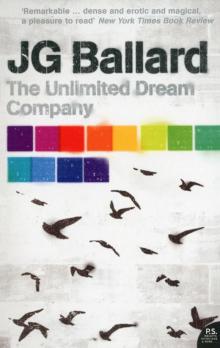 The Unlimited Dream Company
The Unlimited Dream Company Running Wild
Running Wild The Day of Creation
The Day of Creation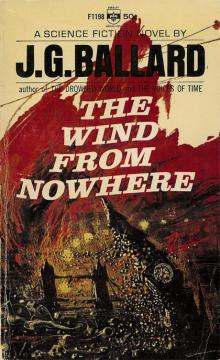 The Wind From Nowhere
The Wind From Nowhere The Complete Short Stories, Volume 2
The Complete Short Stories, Volume 2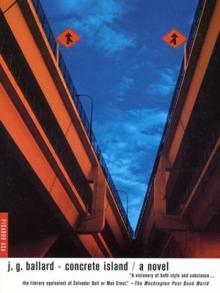 Concrete Island
Concrete Island Empire of the Sun
Empire of the Sun The Kindness of Women
The Kindness of Women Vermilion Sands
Vermilion Sands Super-Cannes
Super-Cannes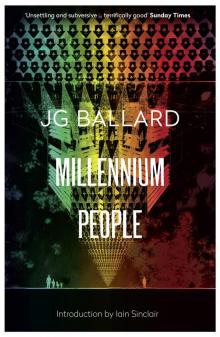 Millennium People
Millennium People The Complete Stories of J. G. Ballard
The Complete Stories of J. G. Ballard Crash
Crash The Drought
The Drought The Atrocity Exhibition
The Atrocity Exhibition The Complete Short Stories: Volume 1
The Complete Short Stories: Volume 1 Miracles of Life: Shanghai to Shepperton: An Autobiography
Miracles of Life: Shanghai to Shepperton: An Autobiography Rushing to Paradise
Rushing to Paradise Chronopolis
Chronopolis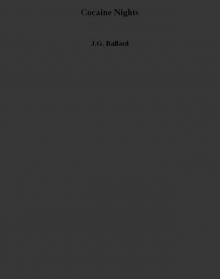 Cocaine Nights
Cocaine Nights High Rise (1987)
High Rise (1987) The Complete Short Stories
The Complete Short Stories The Day of Creation (Harper Perennial Modern Classics)
The Day of Creation (Harper Perennial Modern Classics) The Crystal World
The Crystal World